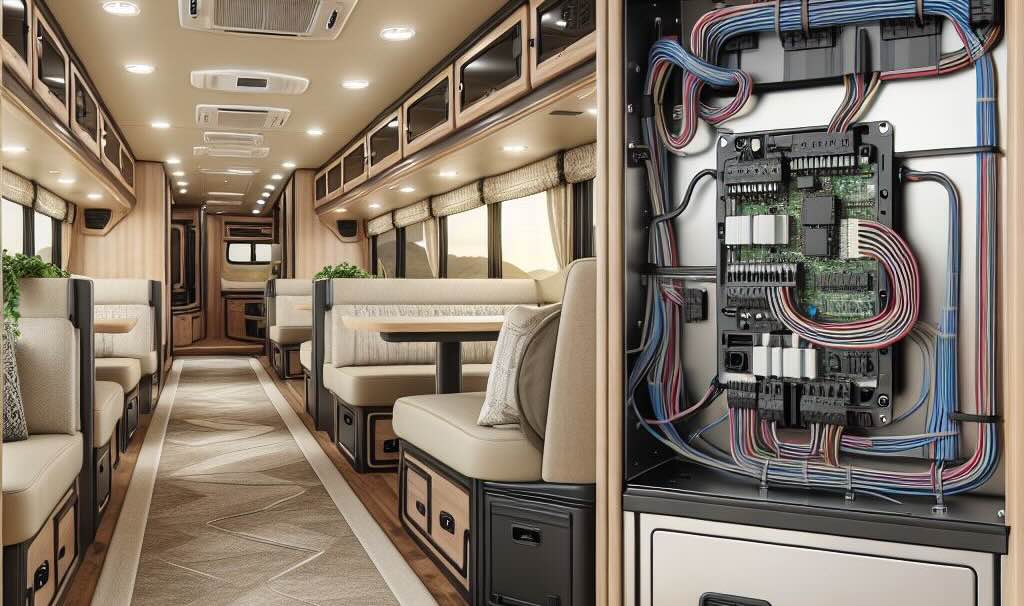The RV converter is a crucial component that helps regulate power within your recreational vehicle by converting 120-volt AC power from an external source into 12-volt DC power used to run many of the RV’s electrical systems, such as lights, water pumps, fans, and other appliances. When the converter goes bad, it can cause several issues, affecting both your RV’s functionality and comfort.
Let’s dive into what happens when your RV converter starts failing and how to recognize the signs.
Common Symptoms of a Bad RV Converter
- 12-Volt Appliances Stop Working.
Since the RV converter is responsible for powering 12-volt appliances, a faulty converter will cause issues with items like interior lights, fans, and water pumps. If these stop functioning, it’s a strong sign that the converter could be the issue. - Battery Won’t Charge.
The RV converter helps recharge your house battery while you’re plugged into shore power. If the battery doesn’t seem to hold a charge or discharges quickly, it may indicate that the converter isn’t working correctly. A malfunctioning converter won’t supply power to recharge the battery, leaving you without backup power. - Dim or Flickering Lights. Dim or flickering lights are a common sign that the RV converter is malfunctioning. Since the converter powers the lighting system, an unstable or faulty converter may cause inconsistent power supply, leading to flickering or dimming lights inside your RV.
- Blown Fuses. If you notice that fuses in your RV’s electrical panel are blowing frequently, it could be due to a faulty converter. A bad converter can overload circuits, causing fuses to blow, which could indicate that it’s time to have your converter checked or replaced.
- Weird Noises. RV converters usually operate quietly, so if you hear unusual humming, buzzing, or clicking noises from the converter, it could be a sign that the internal components are wearing out or malfunctioning.
- Overheating. A failing converter may begin to overheat due to improper power conversion or excessive strain on the electrical components. You might notice the converter feeling hot to the touch or experience a burnt smell.
Consequences of a Bad RV Converter
- Loss of Power for Essential Systems. With a bad converter, you may lose access to essential systems like your lights, water pumps, and fans. This can significantly affect your comfort and ability to use your RV, especially when you’re off-grid or boondocking.
- Damage to Batteries. When the converter fails to charge your RV batteries properly, they can become completely drained or overcharged, both of which can reduce the lifespan of the batteries. Over time, this can lead to expensive replacements.
- Inability to Run Appliances. If the converter fails, you may struggle to operate 12-volt appliances like refrigerators, heaters, and ventilation fans, making your RV less functional, especially if you rely on these devices for everyday use.
- Increased Fire Risk. A converter that is malfunctioning and overheating can pose a fire risk, particularly if it’s causing electrical surges or overheating circuits.
What to Do if Your RV Converter Goes Bad
- Check the Fuses and Circuit Breakers. Before assuming that the converter is the problem, check your RV’s fuses and circuit breakers to ensure there are no other electrical issues at play. A blown fuse or tripped breaker could be a sign of a larger converter issue, but sometimes it’s a simpler fix.
- Test the Batteries. Use a multimeter to check the voltage of your house batteries. If the voltage is consistently low even when plugged into shore power, the converter might not be charging them correctly.
- Inspect the Converter. If you’re comfortable working with electrical components, inspect the converter for visible signs of damage, such as burnt wires or components. Listen for strange noises or feel if it’s running hotter than usual.
- Replace the Converter. If your converter is truly faulty, it’s essential to replace it to avoid further damage to your RV’s electrical system. A professional RV technician can help you determine the right replacement converter for your RV.
- Seek Professional Help. If you’re unsure about diagnosing or fixing the issue yourself, contact a professional RV repair service like Custom-way. We specialize in diagnosing and repairing electrical issues, including converter problems, and we’ll ensure your RV’s power system is back in working order.
How Custom-way Can Help
At Custom-way, we offer professional RV maintenance and repair services to keep your vehicle in top shape. If you suspect your converter is malfunctioning, our team of experts can diagnose the problem and recommend the best solution, whether it’s a repair or replacement. We also offer preventive maintenance to help avoid future issues with your RV’s power system.
Contact Custom-way today for reliable RV services and repairs!

